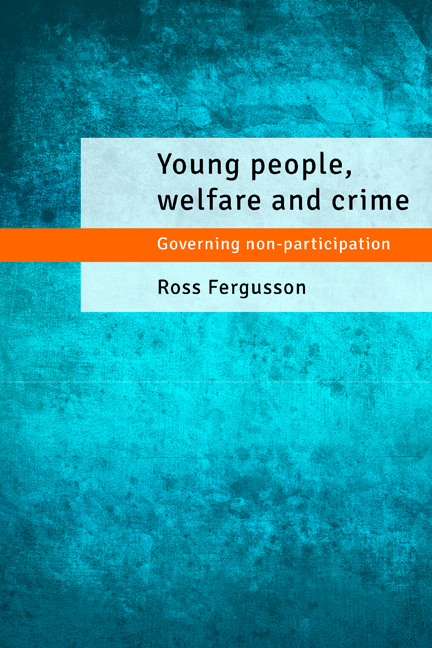Book contents
- Frontmatter
- Dedication
- Contents
- Detailed contents
- List of figures and tables
- List of abbreviations
- About the author
- Acknowledgements
- Part One The crisis of non-participation
- Part Two Work, welfare and crime: research and policy
- Part Three Theorising non-participation
- Part Four Criminalising non-participation
- References
- Copyright material
- Index
Four - Non-participation and crime: constructing connections
Published online by Cambridge University Press: 01 September 2022
- Frontmatter
- Dedication
- Contents
- Detailed contents
- List of figures and tables
- List of abbreviations
- About the author
- Acknowledgements
- Part One The crisis of non-participation
- Part Two Work, welfare and crime: research and policy
- Part Three Theorising non-participation
- Part Four Criminalising non-participation
- References
- Copyright material
- Index
Summary
Finally, why do contemporary crime policies so closely resemble the anti-welfare policies that have grown up over precisely the same period? Because they share the same assumptions, harbour the same anxieties, deploy the same stereotypes, and utilize the same recipes for the identification of risk and the allocation of blame. Like social policy and the system of welfare benefits, crime control functions as an element of the broader system of regulation and ideology that attempts to forge a new social order in the conditions of late modernity.
David Garland (2001) The culture of control: Crime and social order in contemporary society, p 201Introduction
This chapter begins by tracing the construction of the discursive thread that has established a now widely accepted claim that significant connections exist between non-participation and unemployment, between unemployment and crime, and so between non-participation and crime. Of the three prominent discourses that have dominated discussion of non-participation since the 1980s, the social exclusion discourse has been by far the most explicit in identifying these connections. As Chapter Two noted, from the beginning of the use of the concept, New Labour identified a clustered link with crime (Social Exclusion Unit, 2004). Youth Matters (Department for Education and Skills, 2005) reasserted the connection, and its influence grew, including on the basis of research derived from longitudinal studies identified in Chapter Two.
This chapter examines the empirical connections between non-participation and crime identified in a range of studies, particularly in relation to unemployment among young people. These connections are important insofar as they provide powerful legitimacy for claims that the link between non-participation and crime is causal; and insofar as they have constituted a leading element of policy discourses since the rise of New Labour. Through an exploration of policy documents, official statistics and the ‘Risk Factor Prevention Paradigm’, Section 1 traces the construction of the unemployment‒crime link, through major influential research studies and policy discourses. Section 2 examines the contributions of research to interpreting the claimed connections between them. Section 3 reviews the influence of welfare provision on the unemployment‒crime relationship and considers in depth a number of studies that attempt to isolate causal factors that shape it.
- Type
- Chapter
- Information
- Young People, Welfare and CrimeGoverning Non-Participation, pp. 87 - 118Publisher: Bristol University PressPrint publication year: 2016



